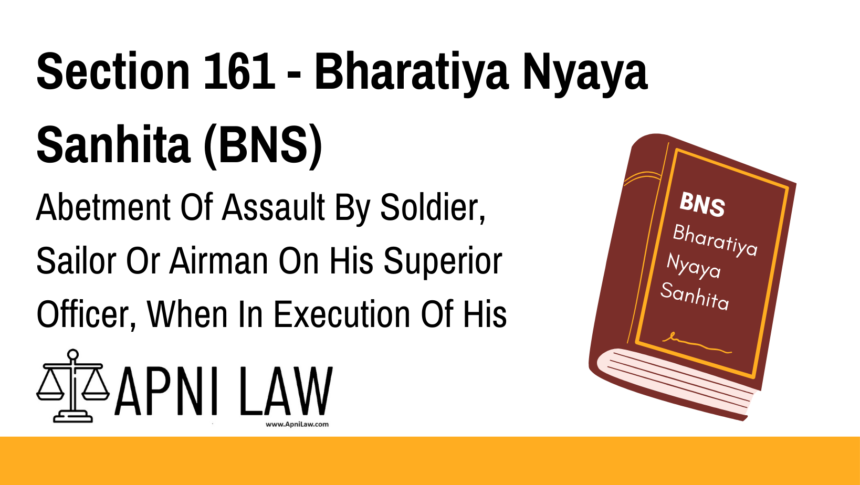Code: Section 161 BNS
Whoever abets an assault by an officer, soldier, sailor or airman, in the Army,
Navy or Air Force of the Government of India, on any superior officer being in the execution
of his office, shall be punished with imprisonment of either description for a term which may
extend to three years, and shall also be liable to fine.
Explanation of Section 161 BNS
1. Understanding the Offense
This section criminalizes the abetment (encouragement, instigation, or assistance) of an assault by military personnel on their superior officers while they are executing their official duties.
Key elements of the offense:
- The accused must have actively abetted an assault.
- The offender (soldier, sailor, or airman) must have committed the assault.
- The victim must be a superior officer performing their official duties at the time of the assault.
2. Importance of This Provision
Discipline and hierarchy are essential in the armed forces. Assaulting a superior officer disrupts command structures and weakens military order. This section ensures strict punishment for anyone instigating such actions.
3. Punishment Under Section 161 BNS
- Imprisonment for up to three years (of either rigorous or simple nature).
- Liable to fine, the amount of which is decided by the court.
The punishment is less severe compared to abetment of mutiny (Section 160 BNS) but still significant, reflecting the gravity of undermining military discipline.
Illustration
Example 1: Civilian Instigating a Soldier to Attack a Superior
A civilian convinces a soldier to physically assault his commanding officer due to grievances. If the soldier follows through with the attack, the civilian will be punished under Section 161 BNS.
Example 2: A Junior Officer Encouraging Physical Retaliation
A junior officer, upset with a superior’s orders, instigates other soldiers to physically retaliate against the commanding officer. If they assault the superior officer, the junior officer will be liable under this provision.
Common Questions and Answers on Section 161 BNS
1. Does the assault have to cause serious injury?
No, even a minor assault (such as pushing or hitting) is covered under this section.
2. Can verbal abuse be considered an “assault” under this section?
No, assault refers to physical violence or an attempt to cause bodily harm, not verbal abuse or disrespect.
3. Who can be punished under this section?
- A civilian or a military personnel who abets (instigates or aids) an assault.
- The actual offender (soldier, sailor, or airman) is punished under separate military laws.
4. What if the superior officer was off duty?
The section applies only if the superior officer was executing official duties at the time of the assault.
5. What is the difference between this and abetment of mutiny (Section 160 BNS)?
- Section 160 BNS deals with abetment of mutiny, which is a severe crime with punishment up to death or life imprisonment.
- Section 161 BNS addresses abetment of assault on a superior officer, which is punished with up to three years of imprisonment and a fine.
Conclusion
Section 161 BNS is designed to protect the authority of superior officers and preserve military discipline. It ensures that no one can instigate or promote violence against a superior officer without facing serious legal consequences.
For expert legal insights, visit ApniLaw today! 🚀











